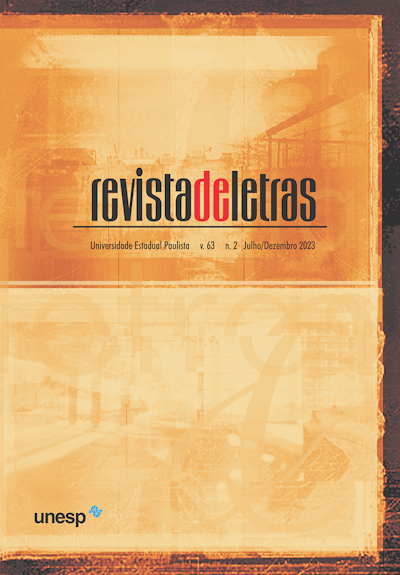Viva meu mestre
Machado e sua ginga
Palavras-chave:
Literatura, Capoeira, Performance, Machado de Assis, LiteragingaResumo
Esse artigo analisou o conto “Teoria do Medalhão” de Machado de Assis, explorando a linguagem como uma arena discursiva, refletindo sobre a complexidade do fazer literário de Machado de Assis. A noção de literaginga age como instância de movimento, estética e escrita, pois dá vazão à mudança de perspectiva sobre a ideia aqui apresentada. No conto o autor constrói seu texto como um jogo de capoeira, onde a oralidade e a performance literária se entrelaçam. Como metodologia o conto foi examinado utilizando as características da literaginga: configuração semântica em oralidade, movimentos corporificados e estéticos, mandinga e cadência. Busca-se apontar que o conto apresenta a oralidade, usando coloquialismos e escolhas verbais que evocam a cadência do jogo de capoeira. A análise destaca a cadência do texto, evidenciada pelo ritmo verbal, cantigas de capoeira e construções contrastantes que dão vida à narrativa. O conto revela uma abordagem estética única, enraizada na cultura negro-brasileira e na experiência periférica. O objetivo central foi analisar o conto “Teoria do Medalhão” da obra selecionada para compor o corpus de modo a comprovar a funcionabilidade da categoria de análise literaginga. apresentando o teor performático no tecer literário do autor, abeirando os saberes ancestrais com seus textos. Ademais, buscou-se retificar a eficiência da categoria de análise desenvolvida por mim, literaginga. Para fomentar os estudos da performance aproximando com a literatura, recorreu-se ao campo de estudos da performance.
Downloads
Publicado
Edição
Seção
Licença
Os manuscritos aceitos e publicados são de propriedade da Revista de Letras. Os originais deverão ser acompanhados de documentos de transferência de direitos autorais contendo assinatura dos autores.
É vedada a submissão integral ou parcial do manuscrito a qualquer outro periódico.
A responsabilidade do conteúdo dos artigos é exclusiva dos autores.
É vedada a tradução para outro idioma sem a autorização escrita do Editor ouvida a Comissão Editorial.

